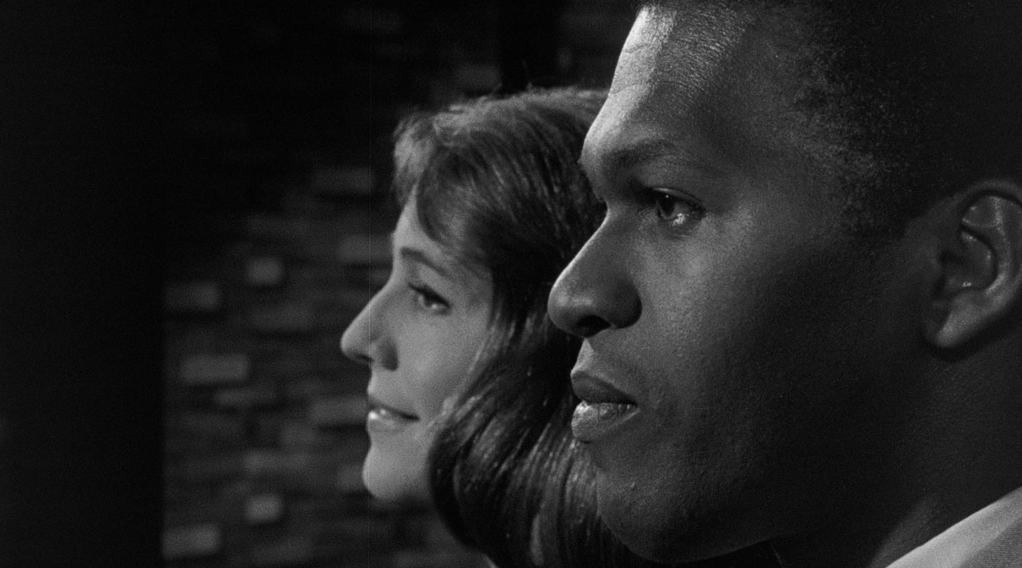At the beginning of Melvin Van Peebles’ feature-film debut, The Story of a Three-Day Pass (1967), its protagonist, an army G.I. named Turner (Harry Baird) stationed in France, is promoted to sergeant status and granted a three-day pass by his captain. Turner is conflicted about his new ranking — his inner voice, represented in a hostile version of himself talking back at him in the bathroom mirror, likens him to Uncle Tom — but happy about the much-needed break. He decides to spend it in Paris, trying not to think about his impending professional responsibilities.
Turner plays the part of the flâneur for the first few hours of his break, dressed as if he were in disguise walking around parks, idling in cafés, and touring catacombs in a hat, trenchcoat, and dark sunglasses. His meager French is just good enough for him to get by. His composure is thrown for a loop come evening, when he stops by a bar and is struck, in a world-stopping, love-at-first-sight kind of way, by a beautiful blonde woman laughing at a table with some friends. He imagines, in this consistently formally daring movie, his soul leaving his body, the crowd of people dancing in the center of the bar clearing his path as if they were the two sides of the Red Sea so that he can approach this woman.
But, in a comic twist, all this will lead to Turner getting a cold shoulder: this woman would really rather get back to her friends. He bumps into a nearby table sat at alone by another woman, Miriam (Nicole Berger), and they strike up a conversation after he nervously drops his sunglasses and she picks them up. He speaks just enough French, and she just enough English, for a connection to be made. By the night’s end, he’s inviting her to spend the remainder of his three-day pass with him.

Harry Baird in The Story of a Three-Day Pass.
They grow closer as their time together progresses — they both speak candidly about their frustrations, with her talking about her thwarted ambitions as a teacher and the unpinpointable fragility of her health — but things are consistently vexed by her myopia around race. She doesn’t comprehend, and doesn’t really try to comprehend, why Turner would be insulted by a serenading club singer calling him Mr. Blackie, while Miriam is comparatively nicknamed for her big eyes. She doesn’t understand how, late in the movie, Turner’s professional standing could be jeopardized by his being seen with her by a few of his white peers while the two laze on the beach.
You can tell, in his first few hours in Paris, that Turner is refreshed to be in a place where his mere existence doesn’t seem so scrutinized simply when he’s walking around the way it might be in America. But Miriam’s trivializing of his race-related frustrations and, more transitorily, a street performer’s superficial invocations of “men in chains,” confront him with how, while some things might be better in Europe, the foundations of certain attitudes cannot be easily escaped. Miriam has even uglier racial conceptions than Turner is aware of. When they’re in bed, Van Peebles cuts to dramatizations of what they’re individually fantasizing about. Turner envisions himself as someone of nobility by proxy of being with her; Miriam imagines herself as a helpless woman chased by “savages” in the jungle, Turner their leader. In The Story of a Three-Day Pass, the fleeting joys of a fling abroad are blighted with caveats, something dismaying always seeming to be waiting to announce itself.
The Story of a Three-Day Pass is based on La Permission, a French-language novel Van Peebles wrote not much earlier than the film’s making. (He’d been inspired by his own experiences in the Air Force.) Its production took just six weeks; the budget tapped out at $200,000. It was a labor of love. It’s also not a film, the way so many debuts do, suggesting a filmmaker still coming into his own. There’s no mistaking Van Peebles as anything less than a confident writer-director with a clear vision and cogent ideas on which he would only continue to build. It’s an early triumph for a filmmaker that would only go bigger and bolder, his agreed-upon magnus opus only a few years away.
